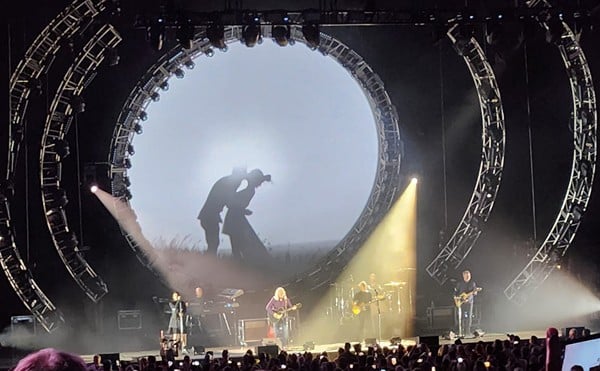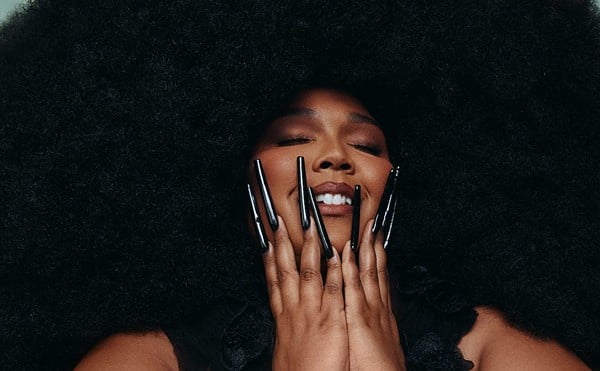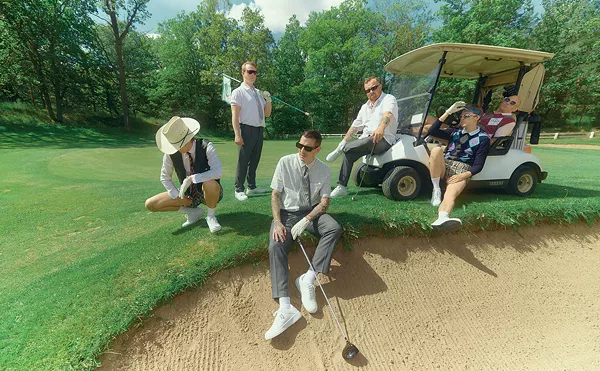"It's like being a diaper attached to the very active ass of a very gluttonous baby," says Otep, who fronts a band of the same name, referring to the machismo-mad Ozzfest experience.
"At the last Connecticut show, we were having this great response, we were having some of the most violent pits of the day, but at the same time, in between our songs, some asshole screams for me to show my tits," Otep recalls. "I said, 'That's not what I'm up here for. Show me some goddamn respect.' Then I see the entire pit has moved toward this guy."
But even without the occasional buffoon's acting up, the struggle for respect amid the sun and suds of Ozzfest is never-ending.
"Here I am, defending myself as a woman and an artist, and I look out at the crowd as soon our set's over, and there's some girl on top of someone's shoulders and she's flashing the guys," Otep sighs. "Sometimes it's almost like I'm fighting a losing battle."
On a variety of levels: As one of the acts on the Ozzfest second stage, where bands rotate on a daily basis, Otep can find herself performing as early as 9 a.m., right about the time mainstage drunkard Zakk Wylde is belching himself to sleep. This, combined with abbreviated set lengths, constantly fluctuating performance times and a pay-to-play price tag that runs a reported $75,000, can make playing the second stage kind of like rock & roll boot camp.
"It's definitely a fuckin' stress situation," says Tomas Haake, drummer for progressive Swedish thrashers Meshuggah, one of the headliners of the second stage. "They took away the third stage, and what they did was take the more known bands from there and move them up to the second stage. They start playing at nine o'clock in the morning, and they have five-minute set changes. With the three last bands -- us, Hatebreed and Down -- we have a whole ten-minute set change. Every band sounds like shit the first song because there's no soundchecks or anything in between; you just get up and play. Sound engineers rip their hair out."
So what's the payoff? Well, for up-and-coming metal bands, few outlets have broken acts as reliably as Ozzfest, which seems to introduce at least one band per year to stardom. During Ozzfest's first nationwide run in 1997, that band was Coal Chamber, whose stint on the tour paved the way for a gold-selling debut. The next year, both Slipknot and System of a Down used the second stage to jump-start their careers and become two of the biggest acts in metal. This past summer, it was rowdy Texans Drowning Pool who most benefited from the Ozzfest side stage; the band's unhinged, show-stealing performances helped score Drowning Pool a platinum record and garnered the group a slot on the mainstage this year.
"I wish I could tell you that there was a point where we went, 'Wow, this thing might actually do something,' but that's not the way it happened," says Drowning Pool frontman Dave Williams. "It exploded, and I think that by the time we caught our breath, it was too late. Ozzfest was done, and we were on another tour. I still don't think we've really caught our breath."
This year, Otep and Meshuggah are two of the strongest contenders to join Drowning Pool and the other Ozzfest magna cum laude graduates among the tour's many success stories. And both are following a similarly unorthodox route to get there. For Meshuggah, this means marrying head-spinning, arrhythmic time signatures and clawing eight-string guitars delivered with a staggering technical prowess that's apt to leave longhairs scratching their heads as much as banging them. The band's latest, the soon-to-be-released Nothing, grounds Meshuggah's dizzying virtuosity in more digestible song structures, making the band slightly easier to grasp.
Otep is comparably heady. Her name is an anagram for "poet," and the title of her band's debut, Sevas Tra, is "art saves" spelled backward. As might be expected, Otep infuses her music with both literary and visual flair, incorporating the pitch-black prose of Baudelaire and Rimbaud into her lyrics and dressing it all up in eye-popping packaging as carefully thought out as the music itself. With Otep's guttural growl -- which sounds like a mama grizzly defending an imperiled cub -- and abstruse themes colliding with buzzsaw guitars and a meat-eating rhythm section, the result comes off sounding something like Sylvia Plath fronting a death-metal band.
"People aren't stupid," Otep says. "They want to learn, and they want to feel. They're hungry, especially, to defy what the mainstream is telling them is art or who they're supposed to be. People want to go beyond that; they just don't know how to do it. I think art, or being creative, can do that. If you go to our Web site, you'll see that kids who are listening to Cannibal Corpse are writing poetry."
Be on the lookout, then, for the guy trying to think of words that rhyme with "entrails" during Otep's set -- we suggest "severed puppy tails." Indeed, the Ozzfest throngs have the potential to be more colorful than ever this year, what with the crossover success of MTV's The Osbournes, which has introduced Ozzy to a whole new audience, including queens, presidents and soccer moms.
"It's still pretty much the same crowd," Williams says. "There's a lot more [people], because the show has generated a lot of hype, but I haven't seen families out here with picnic baskets; it's still kids with black jeans, black shirts and makeup and people throwing up in trash cans. That's Ozzfest."




